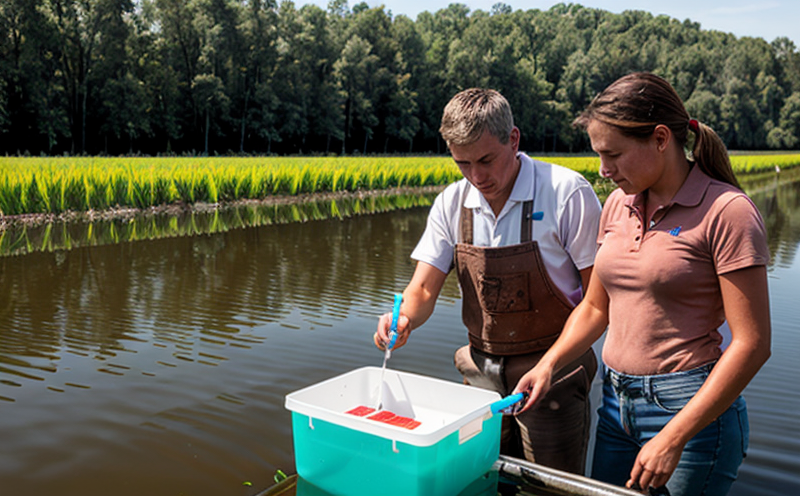Boron Content Testing in Agricultural Water
The presence of boron in agricultural water can significantly impact crop growth and soil health. Excessive levels of boron can lead to toxicity, which may result in reduced yields or even plant death. Therefore, accurate and reliable testing for boron content is crucial for sustainable agriculture. This service involves the analysis of water samples from irrigation systems to ensure compliance with established standards.
In this context, quality managers must closely monitor water quality parameters to maintain optimal growing conditions. Compliance officers need precise data on boron levels to avoid regulatory penalties and ensure safe practices. R&D engineers can leverage these tests to innovate solutions for boron management in agricultural settings. Procurement professionals benefit from this service by verifying the reliability of water supplies before making long-term commitments.
Boron content testing is performed using advanced analytical techniques that can detect even trace amounts of boron. The process typically involves the following steps:
- Collection of representative water samples from various points in the irrigation system
- Precise preparation and dilution of the sample to ensure accurate measurement
- Use of specialized analytical instruments such as inductively coupled plasma mass spectrometry (ICP-MS) or atomic absorption spectroscopy (AAS)
- Analytical determination and reporting of boron concentration levels
The testing process adheres to international standards including ISO, ASTM, EN, and IEC guidelines. This ensures that the results are reliable, repeatable, and can be trusted by all stakeholders involved in agricultural water management.
| Parameter | Standard | Description |
|---|---|---|
| Boron Concentration | ISO 7869-2:1994 | The standard specifies the method for determining boron in water. |
| Sampling Procedure | ASTM D5810-18 | Details the procedures for collecting and handling samples. |
| Instrumentation | EN ISO 7662:2003 | Defines requirements for equipment used in boron analysis. |
The precision and accuracy of these tests are critical for effective water management. By adhering to stringent quality control measures, Eurolab ensures that the results are reliable and actionable. This service not only helps in maintaining soil health but also contributes to sustainable agricultural practices.
Scope and Methodology
The scope of boron content testing in agricultural water encompasses the identification and quantification of boron levels within irrigation systems. The methodology involves a series of steps designed to ensure accurate results:
- Sample Collection: Representative samples are collected from various points in the irrigation system, ensuring that they accurately reflect the overall quality of water.
- Sample Preparation: Samples are prepared and diluted according to specified procedures to ensure accurate measurement by analytical instruments.
- Analytical Determination: The boron content is determined using advanced analytical techniques such as ICP-MS or AAS. These methods provide precise results down to trace levels of boron.
- Data Reporting: Results are reported in compliance with international standards, providing actionable insights for water management decisions.
The methodology adheres strictly to the ISO and ASTM standards mentioned previously. This ensures that the testing process is consistent, reliable, and repeatable. The use of these standards also guarantees that the results can be compared across different locations and time periods.
Eurolab Advantages
EuroLab offers several advantages when it comes to boron content testing in agricultural water:
- Expertise and Experience: Our team of scientists and engineers has extensive experience in environmental analysis, particularly in the context of agriculture.
- State-of-the-Art Facilities: We use cutting-edge instrumentation to ensure accurate and precise results. Our facilities are equipped with the latest technology from leading manufacturers.
- Comprehensive Reporting: In addition to raw data, we provide detailed reports that interpret the results in a way that is actionable for stakeholders.
- Rapid Turnaround Time: We understand the importance of timely results and strive to deliver them within industry-standard timelines.
- Dedicated Support: Our team is always available to provide guidance and support throughout the testing process, ensuring that you get the most out of our services.
EuroLab's commitment to excellence ensures that every test we perform meets or exceeds international standards. This not only enhances trust but also supports sustainable agricultural practices.
Competitive Advantage and Market Impact
Boron content testing in agricultural water is a critical service for maintaining optimal soil health and crop productivity. Here are some of the key advantages:
- Avoidance of Regulatory Penalties: By ensuring compliance with international standards, our clients avoid potential legal issues associated with non-compliant practices.
- Enhanced Crop Yields: Accurate boron testing helps in identifying and mitigating the effects of boron toxicity, leading to healthier crops and higher yields.
- Sustainable Practices: Our services contribute to sustainable agricultural practices by promoting water use efficiency and reducing environmental impact.
- Competitive Edge: Clients can leverage accurate data on boron levels to make informed decisions, gaining a competitive edge in the market.
The demand for reliable boron content testing is growing as more stakeholders recognize its importance. This service not only supports individual clients but also has broader implications for the industry as a whole.





